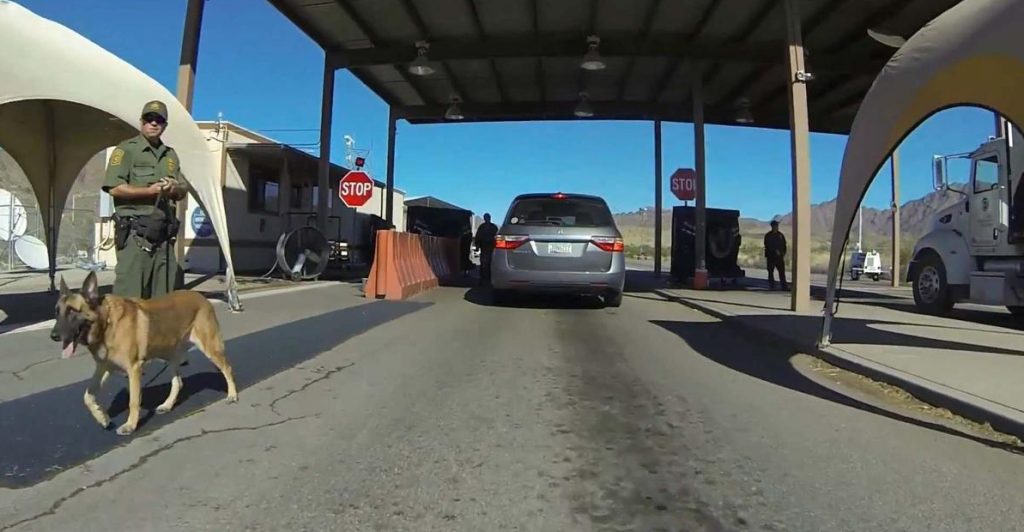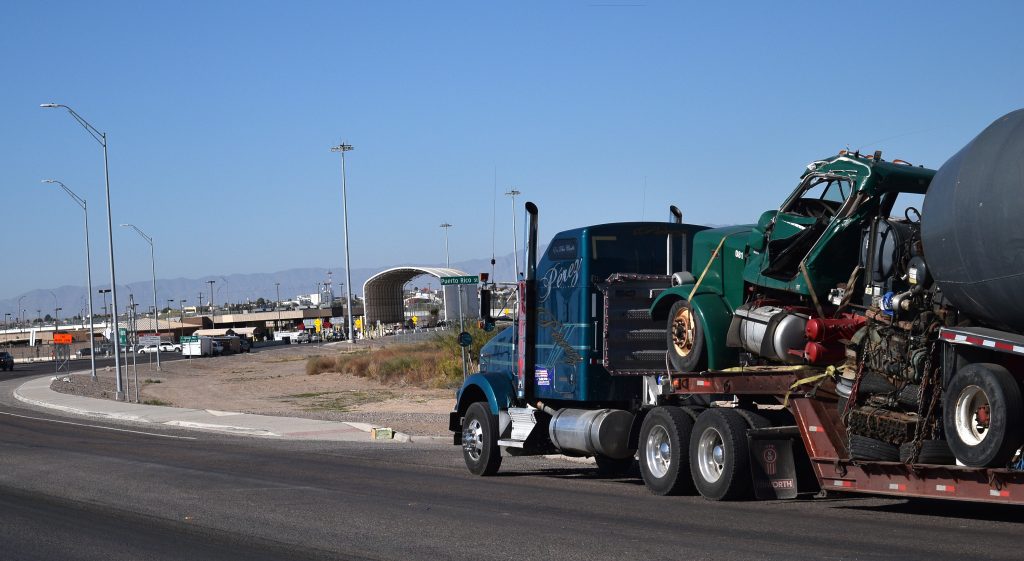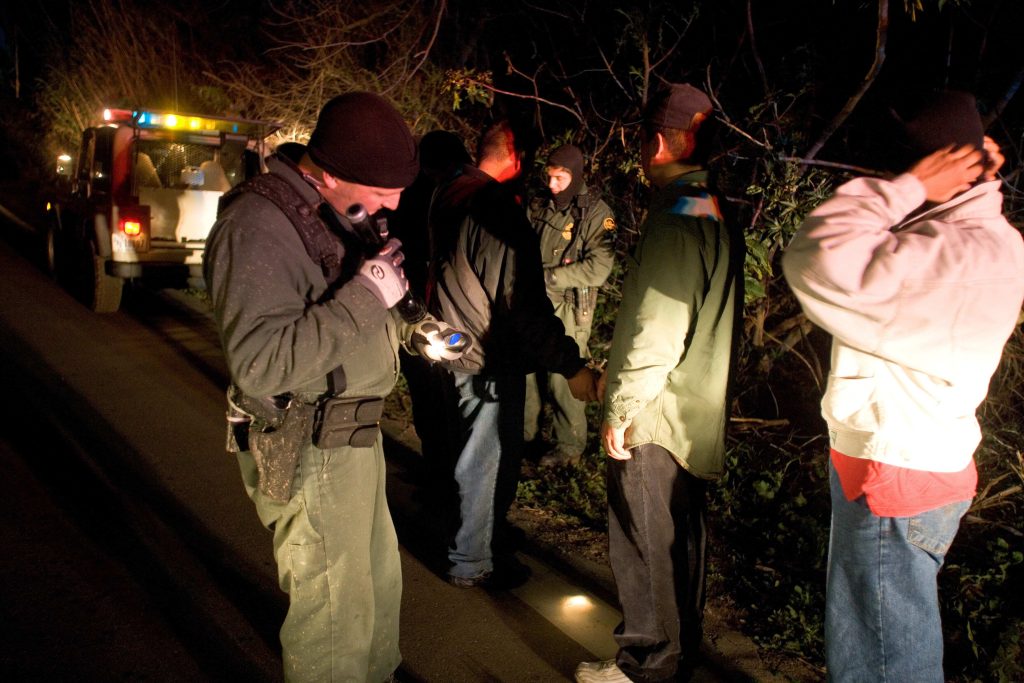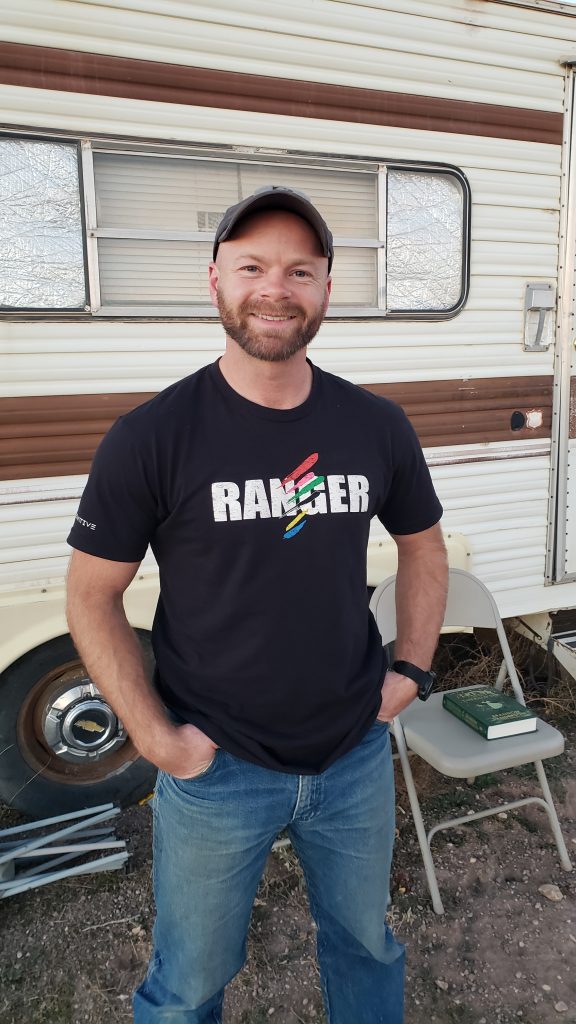
Drive anywhere near the southern border and we encounter Border Patrol highway checkpoints. The Border Patrol officer asks for our name or nationality. Sometimes the dog will be walked around the trailer. The officer nods. We move on. That’s been our experience with Border Patrol.
The little RV park we’re heading for on highway 90, the only east-west road in this area. It’s announced by a rusty neon sign that looks like it was put up in the ‘60s but the neon still works and at night it spells out TUMBLE IN in the dark sky. Situated on the east side of Marfa, Texas between the highway and the railroad, it’s a quiet place except when the train comes along hauling containers to and from Los Angeles or an eastbound truck is going through the gears, getting back up to speed on the highway as it leaves town. West Texas is pretty much treeless and the campground is no exception. Other than two trees planted by the corrugated metal garage that serves as a rec hall, everything and everybody is in plain view.
It’s always nice to talk to folks at the campsite. We meet the most interesting people that way. Say “Hi” to someone and chances are you’re going to learn something.
“Hi” I say to the man getting something out of his car next to his camper.
“How are you doing?” he replies.
“Fine. It’s a beautiful day.”
“This weather is the best. Where are you from?”
“Massachusetts.”
“What are you doing down here?”
“Oh, we come down for the winter. The weather’s a lot better.”
He smiles, “I grew up in Maine. My Dad just sent me a picture of six, eight inches of snow on the ground. My name’s Matt by the way.”
“I’m Alan. So why did you come down here?”
“Border Patrol. I work for Border Patrol.”
“And you live here?”
“Yeah. I traded a gun for this trailer. It’s not beautiful but it works for me. Being single I don’t need a lot.”
“Hey is that your bicycle?” I ask looking at a mountain bike leaning against his trailer.
“Yeah. I ride to work on it sometimes. District headquarters is only about 4 miles down the road.”
“I’ve gotta ask you about tires. I’ve been out on mine about three times and have gotten two flats.”
He laughs, “Let me tell you about Texas riding. You ever hear of goat’s heads? Little round seeds with spines sticking out every direction. You’re going to pick those up everywhere. Sooner or later, probably sooner, one is going to puncture that thin tire. It drove me crazy when I first got here. Then I found these foam things you put in the tire. Tannus they’re called.”
“Yeah, I’ve heard of them. They work?”
“I haven’t had a flat since I got them.”
“What do you like about Border Patrol work?”
He laughs again, “They pay me crazy money to ride around the mountains all day. I love being out in the mountains.”
Now one might be drawn to speculate why a single guy with a good job is living in a trailer he traded for a gun. I’m here to tell you to put that thought right out of your head. It’s an unwritten rule of the road that you don’t inquire as to where folks are coming from or where they are going. If they want to tell you, that’s fine. If they don’t, it doesn’t pay to even think about it. Just accept what you see. Things go a lot smoother that way.
“You patrol the mountains along the border?”

“Yeah. If they make it across the border we get ‘em. They’re mostly nice people. Some bad ones but mostly just ordinary people. They come all this way just trying to get away from something. Maybe something really terrible. But we’ve gotta round ‘em up.”
“What do you do with them?”
“We bring ‘em in. Interview them. Separate out the bad ones. Let the rest go.”
“Just let them go?”
“Basically. We document them. They all claim asylum ‘cause they know. The only way they can legally claim asylum is to present themselves at a border crossing. But because they claim asylum they get a hearing even though they crossed illegally. It might take a year, maybe 2, before their hearing. So they get to stay here until the hearing. They get a free bus ticket to any major city. Most of ‘em have friends or family in the U.S. so they go to wherever they are. A lot coming across here go to Odessa. Some don’t have anybody so they become a problem for the border towns. Most of ’em won’t get asylum approved but they’ll get to stay here until the hearing. That’s the problem.”
“Now don’t get me wrong. We’ve got lots of people that come through the Presidio crossing every day. Good people. Over a hundred a day just to work at the tomato farm. People on business or to visit family. I love those people. They do it right. Show up at the crossing with their papers. Tell us what they’re doing.”

“Those are the good ones. The problem is the ones coming across illegally. There’s way to many. We’re really stretched thin. We’re picking up people everyday in this sector. I’ve probably picked up several thousand over the four years I’ve been in Border Patrol and they just keep coming.”
With hundreds of migrants crossing daily in the area, the U.S. government indefinitely shut down the remote international crossing between Lukeville, AZ, and Sonoyta, Mexico. The morning after it was closed, about a dozen Border Patrol agents in olive green uniforms watched over some 400 migrants who had spent the night by the towering wall of steel bollards. Another 40 officers loaded migrants and drove vans taking them to a temporary field intake center. Chris Clem, retired Yuma, AZ sector chief, said it is part of the smugglers strategy to overwhelm remote areas and stretch agents as thinly as possible, forcing highway checkpoints to close and other resource to be diverted to processing migrants.
AP news report, DECEMBER 8TH
“It’s all run by the cartels. $10,000 to $15,000 they charge. For that they get three tries to get across. If we catch them right at the river we send them back but we’ll see them again in a few days. I don’t call any cartel good but the cartel across from this sector, La Linea, is one of the better cartels. They’re a business. They’re out to make money and not as violent like Sinaloa.”
“$10,000. That’s a lot of money.”
“Yeah. When we round ’em up I try to explain to them. Why don’t you just get a visa? $600 for a visa. Now you’ve spent a whole lot of money and chances are you’re just going to be sent back. I don’t know if they understand.”
“But if La Linea is making money on this, their incentive is to keep it going. Keep finding people to pay them to cross.”
“Yeah, we get people from all over. Haiti, Honduras, Guatemala.” He laughs, “You would think Guatemala would be running out people by now. But yeah, they work with other cartels to the south to move them north. We’re even getting them from Russia and the Middle East now. Everybody’s making money off it and Border Patrol gets stuck trying to stop them at the border.”
“These cartels are smart. They look for our weakness and exploit it. And the cartel guides are good. They know every trail and ranch road. We can catch ‘em when they’re bringing people across but when they’re on their own, man those guys are fast. Little guys but really athletic. I’m in good shape but there’s not many of those guides I can run down on foot when they’re alone.”

“The best is when we catch ‘em at night. We’ve got a lot of tech so we can spot ‘em day or night. If it’s night they’re usually asleep by the time we get there. The night vision googles we walk right up to ‘em. Slip the cuffs on ‘em before they even wake up. They’re pissed but it’s all over for ‘em. The guides will get deported. The others will claim asylum. That’s what I like. Get out there and get the job done.”
“I really like this sector. A lot of guys want to go to the El Paso or Del Rio sectors but here you’ve got beautiful country. It’s laid back. Nobody hassles you.
“What do you think the solution is? I mean the big picture solution.”
“Send them back. If all ’em that’s illegal was sent back the problem would be solved.”
“Hey do you have any recommendations for what to see or do here? We were down to Chinati today.”
“Chinati the art place?”
“Yeah.”
“You want to take a drive? See some of the most beautiful country in the area?
“Sure.”
“Take 67 down to Presidio. As you’re comin’ into town you’ll see a right hand turn. Take that about 20, 25 miles you’ll come to a little town. You can tell because the speed limit goes down. Turn right on the only gravel road and just follow that. It’ll take you through what I think is the prettiest country in west Texas. You’ll be going through the Chinati Mountains.”
“You got good tires?” he glances over at the truck. “And a spare. Yeah, you’ll do alright. The road gets a little rough in places. You’ll see signs ‘Pinto Canyon Ranch, Private Property’ but the road’s a county road. Just stay on it and it’ll bring you right back to Marfa.”
The following day we head off toward Presidio, 60 miles to the south.
Marfa is the county seat of Presidio County. Marfa’s the county seat because, with 1,800 people, it’s the biggest town in the county. Once one leaves the outskirts of Marfa there will be a ghost town and one other building before you reach the outskirts of Presidio. It’s big wide open range land with mountains on either side. When I say range land it’s not like one sees a lot of cattle out there. Little patches of grass grow between the creosote bush, sotol and prickly pear cactus. Not enough to feed many cattle. Barely enough to feed a cow. I pass the time noting the barbed wire fence on either side. Some with wood posts but most are metal now. Three strand, four strand and some of the newer fence with five strands, wire still shiny and sparkling in the sun.
Further south on 67 we can see the Border Patrol checkpoint in the distance. It’s the only inhabited building on the road. They don’t check you going south but they do have a bunch of detection equipment set up on the south bound side of the road and they want you to slow down for it. 50 Ahead the sign says. As we approach, we can see there’s some activity on the north bound side. Lights flashing on top of a pickup truck. Now we can make it out. Two white Border Patrol pickups with a third darker pickup between them. Half a dozen people are sitting in the grass along the barbed wire ranch fence. A Border Patrol officer, squatting next to them, appears to be talking. Two other officers are with a man by the pickup trucks. And then we’re by it. The sign ahead informs us the speed limit is back to 70 and that it’s 11 miles to Presidio.
Early that evening I see Matt sitting outside his trailer reading a book.
“How was your day?”
“They sent me up to El Paso to pick up some stuff. Somethin’ they needed in a hurry I guess.” El Paso is 200 miles away.
“I hate driving in El Paso. Everybody’s in a hurry. Changing lanes, rushing to the next stop light. I’m glad to get back here.”
“We took your advice and drove up Pinto Canyon. That is some beautiful country out there. And remote. We only saw one pickup coming the other way.”
“Did you see any of my friends out there?”
“Border Patrol? They had some people pulled over at the checkpoint on 67. After that just one Border Patrol truck before we got to Pinto Canyon Road. But I wasn’t really looking.”
“I’m sure they were out there. That road’s a favorite of the smugglers. We keep a pretty good eye on it. It avoids our check point on 67.”
“That’s a rugged road in places.”
“That’s why they like it. But once we spot ’em we can send some guys down from Marfa to intercept ’em. That’s where it gets fun. If they see us coming they try to hide the cargo. If its people they’ll send ’em off into the desert to hide. That means we’ve got to find ’em. We can usually tell. Somebody will have dropped something. A child’s toy, a water bottle. Then we just track ’em. Usually they’re happy someone found them. They have no idea where they are or where to go. The guide doesn’t care. If the other team caught him he’ll just say he wants to go back to Mexico. He won’t talk about the people he brought over. He’ll let them die in the desert.”
“That’s the way it goes out here. One illegal dies in Border Patrol custody it makes headlines. We save a ten or twenty people the guides left in the desert and no one mentions it. I don’t even look at the news anymore. And the cartels push this. We’ve had more assaults on officers than ever before. They want something to happen that makes the news ’cause they know that will mean more restrictions on us. They’re smart. They’re playing the long game.”
“Under the previous president … you remember wait in Mexico? We’d lock ’em up, document them and send them back across the border. When their asylum court date came up they could come back for that. And the ones like the guides or ones just trying to get in to earn some cash. We could confiscate what they had. Drug money, phone, stuff like that. It all became property of the U.S. government. I caught one guy he had 8,000 dollars on him. He was begging me. I told him ‘Sorry Bud. You just made a donation to Uncle Sam.’ And, get caught 2 times crossing illegally the third time would be 2 years in jail. It was that kind of stuff that made them think. The illegal crossings slowed down.”
“Trump wasn’t a politician. He wasn’t perfect. He was a vicious negotiator in New York. Kind of an asshole really. That’s what we need down here. Somebody who maybe doesn’t play by the rules but get results.”
“Now the pendulum has swung the other way. Last week we set a record for the highest number of illegal encounters in a day. 11,000 along the southern border. In one day! We don’t have enough people to process that many. It just keeps getting worse cause they know nothing’s going to happen to them. In the worst case they’ll just get deported.”
“But the pendulum will swing back. It always does. Maybe in the next election. I don’t know. But me, I’m here to stay. I love this job. The pay is good and I get to work in outdoors in some beautiful country. I’m in it for the long haul.”

The next morning Matt has long since left for work when we pull out on the highway heading toward Big Bend National Park. We stop in the town of Alpine for fuel and a few groceries. There won’t be much choice in either until we return.
- Border Patrol recorded more than 2.4 million encounters with people crossing the southern border illegally in the year ending September 2023.
- President Trump’s wait in Mexico policy was based on a COVID era policy known as Title 42. President Biden kept Title 42 in place until it was overturned by the courts.
- Additional funding for border security is stalled in Congress by debate over aid to Ukraine and Israel.
- Since the border crossing closed, Lukeville’s two businesses have been boarded up and the town’s few residents have left.
Excellent! Love, Robin.